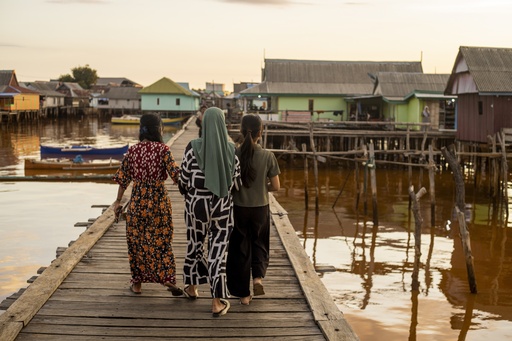
KABAENA, Indonesia — The vibrant blue waters surrounding Kabaena have turned a murky brown, forcing the local population to witness a significant decline in marine life. The octopus and colorful fish previously abundant in these waters have vanished, as have the seaweed patches once harvested by locals. Parents who once enjoyed the warm waters of the Flores Sea are now warning their children against swimming, fearing potential skin irritations and rashes.
The Kabaena community, predominantly consisting of the Indigenous Bajau people, has found their traditional lifestyle deeply impacted by the rapid growth of the mining industry in Indonesia. This surge primarily caters to the global demand for materials essential for stainless steel, electric vehicle batteries, and various other products. Local residents are among the many communities throughout Indonesia facing severe disruption due to this booming mining sector, which has raised serious environmental concerns on both local and international fronts.
Amiruddin, a local fisherman, emphasized that “all residents here have felt the impact” of the mining activities on their lives and environment. With vast reserves of nickel and rich deposits of other minerals, Indonesia continues to expand its mining operations, attempting to satisfy the growing global demand while facing backlash from environmentalists. Nickel processing plants are often situated near coastlines, and barges laden with nickel ore dot the seas, illustrating the close proximity of industrial operations to local communities, often leading to adverse consequences.
The detrimental effects of mining on local ecosystems are evident; research indicates significant tree loss attributed to mining activities, with Indonesia being the hardest hit. From 2001 to 2020, approximately 1.4 million hectares of forests were lost globally due to mining, and Indonesia accounted for the highest percentage of this deforestation.
According to data from Mighty Earth, more than 3,700 hectares of forest land on Kabaena have been cleared by mining enterprises from 2001 to 2023. This deforestation has not only disrupted local wildlife but has also proved catastrophic for local livelihoods. Fishing, previously a reliable source of income and sustenance, has suffered immensely. Due to runoff from mining activities, fish populations have diminished, forcing fishermen like Ilyas to travel farther to find catchable fish. The rising costs of petrol for these longer trips, coupled with dwindling catches, have only worsened their economic situation.
Furthermore, the agricultural landscape on Kabaena has shown similar declines. Residents have reported poor growth of crops such as sugar cane and palm trees due to contamination of water sources from mining runoff. Amal Susanto, a 32-year-old palm sugar farmer, fears the potential impacts of mining operations near his area on his income. “I hope no mines around here, because our income will be impacted,” he expressed.
Health complaints within the community have also surged. Residents are increasingly reporting skin irritations, sore throats, and other health-related issues, with many avoiding water-related activities altogether. Tests from a non-profit environmental organization revealed alarming levels of hazardous elements such as nickel, lead, and cadmium in the local water, air, and shellfish, raising concerns about long-term health effects from potential exposure to these toxic substances.
The adverse effects of mining are not confined to Kabaena alone. Nearby, the village of Torobulu is also grappling with similar challenges as a nickel mine operates in close proximity to community amenities. Despite a recent ruling by Indonesia’s constitutional court aimed at protecting small islands and their ecosystems from destructive activities like mining, permits continue to be issued for mining operations on Kabaena. Notably, since the court ruling, forest loss has persisted, with significant areas cleared for mining purposes even after the ruling.
Residents feel increasingly powerless in the face of these ongoing challenges. As Nina, an Indigenous Bajau local, remarked, “What else can we do if the water is like this? We’re small people — we can’t do anything. We have to surrender.”
In sum, the situation on Kabaena represents a broader trend affecting many communities across Indonesia as the demands of modern mining practices clash tragically with the sustenance of traditional lifestyles and the preservation of the environment.
